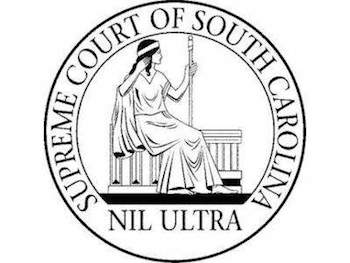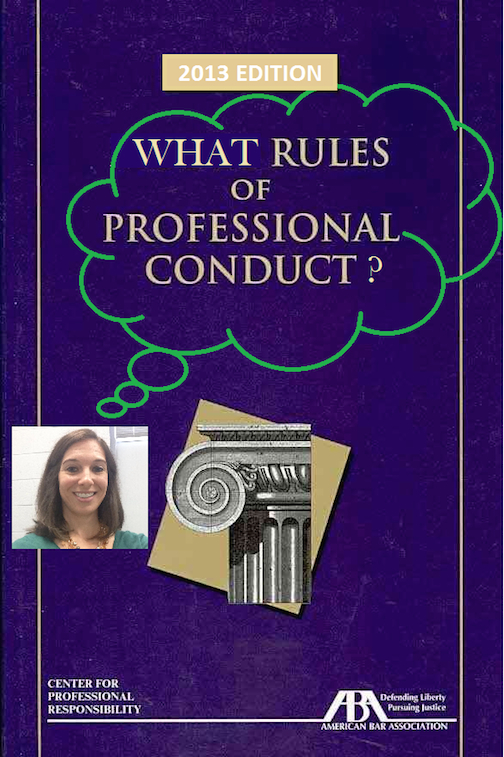Former Assistant District Attorney Jamie Gentry LaPrad crossed to the wrong side of the law, The Dispatch concluded, after the public got wind of LaPrad’s nefarious conduct while employed by the Davidson County District Attorney’s Office.
That conduct allegedly involved threats to geld a coworker after he called off a romantic relationship with LaPrad. It also appears there may have been some sort of lingering lust involving a “big candy cane” and other “toys” the two once enjoyed using on each other.
But enough about that. Our earlier Jamie Gentry LaPrad post details the allegations included in coworker Alan Martin’s motion for a protective order against LaPrad, which was granted summarily.
Shifting gears, this post responds to the swell of comments we have received in the wake of our earlier posts on the Jamie Gentry LaPrad scandal, and in particular to the leitmotif in those comments concerning the regulation of North Carolina prosecutors’ conduct.
To be clear, whether Jamie Gentry LaPrad committed misconduct in the course of her duties as a prosecutor for the State of North Carolina is beyond the scope of this post—as explained below, those questions will be up to the North Carolina State Bar and the courts to decide. Instead, this post simply covers rules that all prosecutors in North Carolina must follow, from the perspective of legal ethics.
Prosecutorial misconduct
To help frame the discussion that follows, we begin with an overview of prosecutorial misconduct from The Open File:
Prosecutors commit misconduct when in the course of their professional duties they act in ways that are inconsistent with ethical mandates they are obliged to obey. Such misconduct exists at and near the intersection of two sets of rules: one is the legal rules that bind prosecutors so as to ensure due process – the state and federal constitution, statutory law, rules of criminal procedure, judicial orders, and the like. The other is the ethical standards of the legal profession as expressed in each state bar’s rules of professional responsibility and similar professional codes.
Often an act of prosecutorial misconduct will violate both legal and professional codes. Though, because the codes differ in some ways, sometimes an act of misconduct may violate one code but not the other. Prosecutors are required to abide by both.
Enforcement of the two codes differs. When prosecutors violate legal rules as part of a criminal case, the primary recourse is for the criminal defendant to ask to have his conviction overturned (or if the trial is in progress, to ask the judge for a mistrial, to strike matters from the record, or to otherwise minimize the damage caused). When prosecutors violate professional rules, the bar complaint process is the primary enforcement mechanism.
Our focus here is only on one of the sources of law that governs prosecutors’ conduct—North Carolina’s code of professional responsibility, to which we now turn.
North Carolina Rules of Professional Conduct
Generally speaking, prosecutors’ conduct is regulated by professional norms—as mentioned above, every state adopts ethics codes to regulate the legal profession within its borders, and the courts in each state adopt ethics rules to govern lawyers practicing in their jurisdictions. These rules are largely based on model rules developed by the American Bar Association.
But in the practice of law, prosecutors are special, in the sense that they are not only subject to the rules that govern all lawyers generally in each state but also held to a heightened set of rules, given their status as “ministers of justice.”
Here are some of those rules (followed by instructive commentary), pulled directly from the North Carolina State Bar’s website:
Rule 3.8 Special Responsibilities of a Prosecutor
The prosecutor in a criminal case shall:
(a) refrain from prosecuting a charge that the prosecutor knows is not supported by probable cause;
(b) make reasonable efforts to assure that the accused has been advised of the right to, and the procedure for obtaining, counsel and has been given reasonable opportunity to obtain counsel;
(c) not seek to obtain from an unrepresented accused a waiver of important pretrial rights, such as the right to a preliminary hearing;
(d) after reasonably diligent inquiry, make timely disclosure to the defense of all evidence or information required to be disclosed by applicable law, rules of procedure, or court opinions including all evidence or information known to the prosecutor that tends to negate the guilt of the accused or mitigates the offense, and, in connection with sentencing, disclose to the defense and to the tribunal all unprivileged mitigating information known to the prosecutor, except when the prosecutor is relieved of this responsibility by a protective order of the tribunal;
(e) not subpoena a lawyer in a grand jury or other criminal proceeding to present evidence about a past or present client, or participate in the application for the issuance of a search warrant to a lawyer for the seizure of information of a past or present client in connection with an investigation of someone other than the lawyer, unless:
(1) the information sought is not protected from disclosure by any applicable privilege;
(2) the evidence sought is essential to the successful completion of an ongoing investigation or prosecution; and
(3) there is no other feasible alternative to obtain the information;
(f) except for statements that are necessary to inform the public of the nature and extent of the prosecutor’s action and that serve a legitimate law enforcement purpose, refrain from making extrajudicial comments that have a substantial likelihood of heightening public condemnation of the accused and exercise reasonable care to prevent investigators, law enforcement personnel, employees or other persons assisting or associated with the prosecutor in a criminal case from making an extrajudicial statement that the prosecutor would be prohibited from making under Rule 3.6 or this Rule.
Comment
[1] A prosecutor has the responsibility of a minister of justice and not simply that of an advocate; the prosecutor’s duty is to seek justice, not merely to convict. This responsibility carries with it specific obligations to see that the defendant is accorded procedural justice and that guilt is decided upon the basis of sufficient evidence. Precisely how far the prosecutor is required to go in this direction is a matter of debate and varies in different jurisdictions. See the ABA Standards of Criminal Justice Relating to the Prosecution Function. A systematic abuse of prosecutorial discretion could constitute a violation of Rule 8.4.
[2] The prosecutor represents the sovereign and, therefore, should use restraint in the discretionary exercise of government powers, such as in the selection of cases to prosecute. During trial, the prosecutor is not only an advocate, but he or she also may make decisions normally made by an individual client, and those affecting the public interest should be fair to all. In our system of criminal justice, the accused is to be given the benefit of all reasonable doubt. With respect to evidence and witnesses, the prosecutor has responsibilities different from those of a lawyer in private practice; the prosecutor should make timely disclosure to the defense of available evidence known to him or her that tends to negate the guilt of the accused, mitigate the degree of the offense, or reduce the punishment. Further, a prosecutor should not intentionally avoid pursuit of evidence merely because he or she believes it will damage the prosecutor’s case or aid the accused.
[3] Paragraph (c) does not apply, however, to an accused appearing pro se with the approval of the tribunal. Nor does it forbid the lawful questioning of an uncharged suspect who has knowingly waived the rights to counsel and silence.
[4] Every prosecutor should be aware of the discovery requirements established by statutory law and case law. See, e.g., N.C. Gen. Stat. §15A-903 et. seq, Brady v. Maryland, 373 U.S. 83 (1963); Giglio v. U.S., 405 U.S. 150 (1972); Kyles v. Whitley, 514 U.S. 419 (1995). The exception in paragraph (d) recognizes that a prosecutor may seek an appropriate protective order from the tribunal if disclosure of information to the defense could result in substantial harm to an individual or to the public interest.
[5] Paragraph (e) is intended to limit the issuance of lawyer subpoenas in grand jury and other criminal proceedings, and search warrants for client information, to those situations in which there is a genuine need to intrude into the client-lawyer relationship. The provision applies only when someone other than the lawyer is the target of a criminal investigation.
[6] Paragraph (f) supplements Rule 3.6, which prohibits extrajudicial statements that have a substantial likelihood of prejudicing an adjudicatory proceeding. In the context of a criminal prosecution, a prosecutor’s extrajudicial statement can create the additional problem of increasing public condemnation of the accused. Although the announcement of an indictment, for example, will necessarily have severe consequences for the accused, a prosecutor can, and should, avoid comments which have no legitimate law enforcement purpose and have a substantial likelihood of increasing public opprobrium of the accused. Nothing in this Comment is intended to restrict the statements that a prosecutor may make which comply with Rule 3.6(b) or 3.6(c).
[7] Like other lawyers, prosecutors are subject to Rules 5.1 and 5.3, which relate to responsibilities regarding lawyers and nonlawyers who work for or are associated with the lawyer’s office. Paragraph (f) reminds the prosecutor of the importance of these obligations in connection with the unique dangers of improper extrajudicial statements in a criminal case. In addition, paragraph (f) requires a prosecutor to exercise reasonable care to prevent persons assisting or associated with the prosecutor from making improper extrajudicial statements, even when such persons are not under the direct supervision of the prosecutor. Ordinarily, the reasonable care standard will be satisfied if the prosecutor issues the appropriate cautions to law-enforcement personnel and other relevant individuals.
History Note: Statutory Authority G. 84-23
Adopted July 24, 1997; Amended March 1, 2003.
Amended November 16, 2006.







